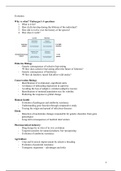Samenvatting
Samenvatting tentamenstof evolutiebiologie
- Vak
- Evolutiebiologie
- Instelling
- Universiteit Leiden (UL)
Dit was de tentamenstof van evolutiebiologie in het 1e jaar aan de Universiteit Leiden. Het vak werd in het engels gegeven dus de samenvatting is ook in het engels
[Meer zien]





